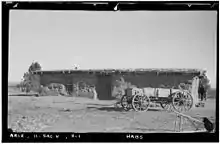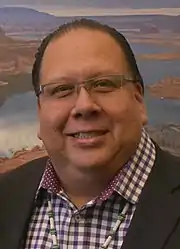Gila River Indian Community
| |
|---|---|
 Flag | |
 Location of Gila River Indian Community in northwestern Pinal County, Arizona. The Phoenix metropolitan area is located north of the reservation. | |
| Country | United States |
| State | Arizona |
| Area | |
| • Total | 1,511.90 km2 (583.749 sq mi) |
| Population (2020) | |
| • Total | 14,260 |
| Website | Gila River Indian Community |
The Gila River Indian Community (GRIC) (O'odham language: Keli Akimel Oʼotham, meaning "Gila River People", Maricopa language: Pee-Posh) is an Indian reservation in the U.S. state of Arizona, lying adjacent to the south side of the cities of Chandler and Phoenix, within the Phoenix Metropolitan Area in Pinal and Maricopa counties. The Gila River Indian Community was established in 1859, and the Gila River Indian Community was formally established by Congress in 1939. The community is home for members of both the Akimel O’odham (Pima) and the Pee-Posh (Maricopa) tribes.
The reservation has a land area of 583.749 square miles (1,511.90 km2) and a 2020 Census population of 14,260.[1] It is made up of seven districts[2] along the Gila River and its largest communities are Sacaton, Komatke, Santan, and Blackwater. Tribal administrative offices and departments are located in Sacaton. The Community operates its own telecom company, electric utility, industrial park and healthcare clinic, and publishes a monthly newspaper. It has one of the highest rates of Type 2 diabetes in the world, around 50% of the population.[3] The community has voluntarily contributed to Type 2 diabetes research, by participating in many studies of the disease.

Government
Under their constitution, tribal members elect a governor and lieutenant governor at-large. They also elect 16 council members, from single-member districts or sub-districts with roughly equal populations.
Officials listing

- Stephen Roe Lewis, Governor[4]
- Robert Stone, Lt. Governor[5]
- Arzie Hogg, Council Member, Dist 1
- Joey Whitman, Council Member, Dist 1
- Carol A. Schurz, Council Member, Dist 2
- Carolyn Williams, Council Member, Dist 3
- Rodney Jackson, Council Member, Dist 3
- Barney B. Enos Jr., Council Member, Dist 4
- Pamela Johnson, Council Member, Dist 4
- Jennifer Allison, Council Member, Dist 4
- Monica Antone, Council Member, Dist 4
- Janice Stewart, Council Member, Dist 5
- Thomas White, Council Member, Dist 5
- Lawrence White, Council Member, Dist 5
- Marlin Dixon, Council Member, Dist 5
- Charles Goldtooth, Council Member, Dist 6
- Anthony Villareal Sr., Council Member, Dist 6
- Terrance Evans, Council Member, Dist 6
- Devin C. Redbird, Council Member, Dist 7[6]
Attractions
The first casino opened in 1994.[7]
Ira H. Hayes Memorial Library
The Ira H. Hayes Memorial Library is located in District 3 in Sacaton, and provides a variety of services to the community.[8]
Current communities
- Bapchule (Pihpchul)
- Blackwater (Chukma Shuhthagi)
- Casa Blanca
- Co-op Village (Chichino)
- Gila Crossing (Kuiva)
- Goodyear (Valin Thak)
- Komatke (Komadk)
- Maricopa Colony
- Sacate Village
- Sacaton (Ge'e Kih)
- Sacaton Flats (Hahshani Kehk)
- St. John's
- Santa Cruz (Hia-t-ab)
- Santan/Santa Ana (Santan)
- Stotonic (S-totonigk)
- Sweetwater (S-iʼovi Shuhthagi)
- Vahki (Va'akih)
- Wet Camp Village
Lone Butte Ranch
Lone Butte Ranch (33°13′57″N 112°02′50″W / 33.23250°N 112.04722°W) is a populated place situated in the community.[9][10] It has an estimated elevation of 1,112 feet (339 m) above sea level.[11]
Transportation
The community owns and operates Gila River Memorial Airport, a small, private-use airport, located 4 miles southwest of the central business district of Chandler. It was used for cropdusting and air charter operations, with no scheduled commercial services. The airport is no longer used and is in a state of total abandonment. The community also operates Gila River Transit, a public transit system serving all seven districts.
I-10 was built through the southeast to north-central portion of Gila River lands, bringing significant highway traffic through the area.
Laws
The Constitution and Bylaws of the Gila River Indian Community of Arizona was ratified by the tribe January 22, 1960, and approved by the US Secretary of the Interior on March 17, 1960. It is available online.[12]
The current Gila River legal code was enacted in 2009. Amendments enacted 15 May 2013, are available online.[13]
Marriage law
Gila River does not recognize marriages performed elsewhere in the state of Arizona. On 15 July 2015, in response to the Obergefell v. Hodges Supreme Court ruling legalizing same-sex marriage in the United States, the Community Council passed a motion by a vote of 14 to 2 that the gendered language of the Gila River marriage code meant that same-sex marriage was not recognized:
1) The Community Council exercises its sovereignty and recognizes that the intent of GRIC code, Title 9, Section 9.103 is that a marriage is between and man and a woman; 2) the Community will maintain the status quo – that same sex marriage is not traditionally recognized in the Community – pending full consideration by the Standing Committees, Community Council and Community members and of any legislative changes; 3) the Community Court shall not issue any marriage licenses to couples of the same sex and no appointed or elected official of the Community shall officiate at any same sex marriage which takes place on the Gila River Indian Reservation; 4) the Office of General Counsel is directed to draft and present amendments to the GRIC Code within 30 days which more clearly recognizes and codifies the Community's historical tradition, both Akimel Oʼodham and Pee Posh, of not permitting or recognizing same-sex or common law marriages since time immemorial.[14]
Notable people
- Beulah Archuletta (1909–1969), née Donahue, was Pee-Posh (Maricopa) and an actress.[15]
- Ira Hayes (1923-1955), one of the six Marines depicted in the Raising the Flag on Iwo Jima photograph.
- Jay Morago (1917-2008), served as the first Governor of the Gila River Indian Community from 1954 until 1960 and helped to draft the reservation's 1960 constitution.[16][17]
- Mary Thomas (1944-2014), was the first woman elected as Governor of the Gila River Indian Community, serving from 1994 until 2000.[7]
- Natalie Diaz (1978-), Pulitzer-prize winning poet, educator, and activist
See also
References
- ↑ "Gila River Indian Community Primary Care Area (PCA) – 2021 Statistical Profile" (PDF).
- ↑ "Discover the Gila River Indian Community". www.gilariver.org.
- ↑ A political economy of diabetes, pregnancy, and identity in the Gila River Indian Community, Carolyn Smith-Morris, 2001. Dissertation (Advisor Ana T. Ortiz) University of Arizona
- ↑ Admin. "Governor Stephen Roe Lewis". www.gilariver.org. Retrieved January 20, 2019.
- ↑ Admin. "Lt. Governor Robert Stone". www.gilariver.org. Retrieved January 20, 2019.
- ↑ Admin. "Council Members". www.gilariver.org. Retrieved January 20, 2019.
- 1 2 McKinnon, Shaun (August 22, 2014). "Mary Thomas, first woman to lead Gila River, dies at 70". The Arizona Republic. Retrieved October 5, 2014.
- ↑ Ira H. Hayes Memorial Library pamphlet obtained from library on February 16, 2018
- ↑ "Lone Butte Ranch (in Maricopa County, AZ) Populated Place Profile". AZ Hometown Locator. Retrieved December 17, 2016.
- ↑ Metro Phoenix Point Source 208 Plan: Environmental Impact Statement. Northwestern University. 1979. pp. 2–74.
- ↑ "Feature Detail Report for: Lone Butte Ranch". Geographic Names Information System. United States Geological Survey, United States Department of the Interior.
- ↑ United States Department of the Interior, Bureau of Indian Affairs, Constitution and Bylaws of the Gila River Indian Community, Arizona
- ↑ Ordinance GR-03-13
- ↑ "Gila River Indian News, Community Council Action Sheets". gricnews.org. 2015-08-07. p. 12, column 3. Retrieved 2021-08-04.
- ↑ Beulah Archuletta played "Look" in The Searchers. Aleiss, Angela (August 20, 2021). "In the Golden Age of Hollywood, a Local Pee-Posh Woman Makes Her Mark on the Silver Screen". Gila River Indian News. Retrieved August 24, 2021.
- ↑ Boehnke, Megan (May 20, 2008). "Gila River's first governor dies at 90". The Arizona Republic. Retrieved May 26, 2008.
- ↑ "Jay Morago Jr. Obituary". Casa Grande Dispatch. May 17, 2008. Archived from the original on June 8, 2011. Retrieved May 26, 2008.
- Gila River Reservation, Arizona United States Census Bureau

